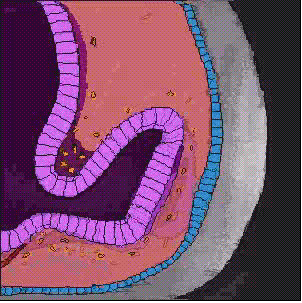Human Tissue Biology A464
|
Specialized Sensory Organs, the Eye |
|
|
 Each
eye is derived as an outgrowth of the brain in the early embryo and
the unique and highly complex structure of the eye reflect its
origin. In studying a histological section of the eye, one must keep
in mind the fact that it is composed basically of three layers and
that, in the living state, the anterior portion of the eye is filled
with fluid which is being continually produced and absorbed. The
posterior region behind the lens is filled with an almost fluid form
of CT called vitreous humor. The lens itself always hardens very
severely during fixation and is difficult to section.The animated image to right is courtesy
of
Loyola University of
Chicago, and demonstrates the developmental stages of the human
eye. Each
eye is derived as an outgrowth of the brain in the early embryo and
the unique and highly complex structure of the eye reflect its
origin. In studying a histological section of the eye, one must keep
in mind the fact that it is composed basically of three layers and
that, in the living state, the anterior portion of the eye is filled
with fluid which is being continually produced and absorbed. The
posterior region behind the lens is filled with an almost fluid form
of CT called vitreous humor. The lens itself always hardens very
severely during fixation and is difficult to section.The animated image to right is courtesy
of
Loyola University of
Chicago, and demonstrates the developmental stages of the human
eye.
Objectives
- Understand the general
organization of the eye and recognize the major tissues of the
eye and their basic functions.
- Be able to recognize the various
major layers of the eye (corneosclera, uvea, and retina)
Detail of the
eye. |
|